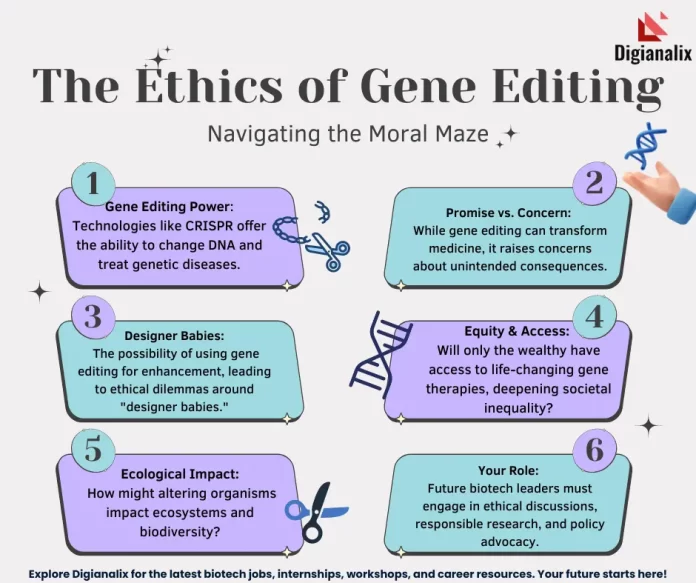Hey there, biotech enthusiasts and deep thinkers! 👋 Today, we’re diving into one of the most fascinating and controversial topics in modern science: gene editing. As our ability to manipulate the genetic code advances rapidly, we’re faced with profound ethical questions. Let’s explore this complex issue together!
🧬 What is Gene Editing?
Before we delve into the ethics, let’s quickly recap what gene editing is:
Gene editing refers to technologies that allow scientists to change an organism’s DNA. This can involve adding, removing, or altering genetic material at particular locations in the genome. The most well-known tool for this is CRISPR-Cas9, often described as “genetic scissors.”
🔬 The Promise of Gene Editing
Gene editing holds immense potential for:
- Treating genetic diseases
- Enhancing crop yields and resilience
- Developing new therapies for cancer and other diseases
- Creating more sustainable and eco-friendly products
🚫 The Ethical Concerns
However, with great power comes great responsibility. Here are some key ethical issues:
- 👶 Designer Babies: Could gene editing lead to “designer babies” with enhanced traits?
- 🧬 Unintended Consequences: What if gene edits have unexpected effects on future generations?
- 🌍 Ecological Impact: How might genetically edited organisms affect ecosystems?
- 💰 Access and Inequality: Will gene editing therapies only be available to the wealthy?
- 🔬 Research Ethics: How can we ensure ethical practices in gene editing research?
🤔 Navigating the Moral Maze
As future biotech professionals, researchers, or policymakers, you may find yourselves grappling with these issues. Here are some frameworks to consider:
- 📊 Utilitarianism: Evaluate the overall benefits versus potential harms to society.
- 🧭 Principlism: Consider key ethical principles like autonomy, beneficence, non-maleficence, and justice.
- 🌱 Environmental Ethics: Assess the impact on ecosystems and biodiversity.
- 🤝 Social Justice: Examine issues of equity and access in gene editing applications.
💡 Your Role in Shaping the Future
As the next generation of biotech leaders, you have a crucial role to play:
- 📚 Stay Informed: Keep up with the latest developments in gene editing and bioethics.
- 🗣️ Engage in Dialogue: Participate in discussions about the ethical implications of gene editing.
- 🔬 Conduct Responsible Research: If you’re in research, prioritize ethical considerations in your work.
- 📝 Advocate for Ethical Policies: Support the development of robust ethical guidelines for gene editing.
- 🌍 Consider Global Perspectives: Recognize that ethical viewpoints may vary across cultures and regions.
🤔 Food for Thought
As we wrap up, here are some questions to ponder:
- Where do you draw the line between therapeutic and enhancement applications of gene editing?
- How can we balance scientific progress with ethical considerations?
- What role should public opinion play in shaping gene editing policies?
Share your thoughts in the comments below! Let’s start a thoughtful discussion about the future of gene editing and its ethical implications.
Remember, as future biotech professionals, your voice matters in this crucial debate. The decisions we make today will shape the world of tomorrow!




